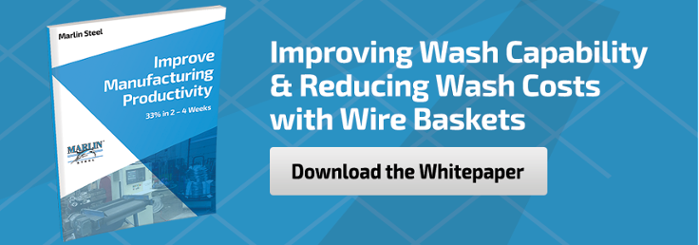 The U.S. manufacturing industry is a key part of America’s economy, supporting millions of jobs either directly or indirectly. Every day, people either go to work in factories, sell products made by manufacturers, or help develop IP that supports and improves the manufacturing industry.
The U.S. manufacturing industry is a key part of America’s economy, supporting millions of jobs either directly or indirectly. Every day, people either go to work in factories, sell products made by manufacturers, or help develop IP that supports and improves the manufacturing industry.
However, there are many challenges faced by American manufacturers in today’s economy. These challenges can make succeeding in the manufacturing industry difficult. In fact, Marlin Steel faces these challenges daily.
With each challenge, there is also an opportunity. In finding ways to overcome challenges, U.S. manufacturers can create opportunities for greater efficiency and growth.
So, what are the challenges, and opportunities, that American manufacturing businesses face today?
Here’s our top 3 list:
#1: The Growing Skills Shortage
Many American manufacturers are now facing a severe obstacle to meeting their business objectives: a loss of skilled labor. As the older, more experienced baby boomer generation workers continue to leave the workforce, there aren’t enough new recruits among generation X and Y to replace them.
This is leaving many manufacturers without workers who have the mission-critical skills that they need to function.
However, as problematic as this skills gap or shortage can be for manufacturers, it also creates a unique opportunity to become involved in the process of shaping the manufacturing workforce.
In addressing the skills gap, manufacturers can help promote courses at local schools and universities that provide students with skills that manufacturers sorely need. This not only helps create future manufacturing workers, but helps promote the industry to America’s youth.
Or, manufacturers can follow Marlin’s example by promoting skills growth among current employees. By rewarding workers for learning specific skills, Marlin has created a workforce with depth and skills redundancy that can adapt to changing work needs.
For example, if one work cell has a low demand for service, the workers in that work cell can be redirected to other work cells that need extra support. This increases job stability, and ensures that Marlin can meet customer needs efficiently.
#2: Foreign Trade
For years, American manufacturers have had stiff competition from foreign companies that could produce the same products as them, but often for far less. Whether because of government subsidizing, cheaper labor, or unfair trade practices such as one-way tariffs and IP theft, these foreign-based manufacturers have frequently undercut American businesses in our home markets.
Yet, as devastating as imported goods have been to some manufacturers, foreign trade represents an enormous opportunity for American manufacturers.
With heavy investments in training and automation, American manufacturers have vastly improved their productivity and ability to meet incredibly tight parts tolerances for manufactured goods. This allows U.S.-based manufacturers to complete orders for parts that many commodity-oriented manufacturers can’t compete in.
Using this fact, Marlin Steel has actually been able to turn the tables on Chinese manufacturers, exporting precision-engineered custom steel wire baskets to Chinese companies when their local suppliers couldn’t fulfill their needs.
Opening up foreign markets to American manufacturers could help American businesses grow exponentially. After all, most of the world’s buying population lives outside America’s borders.
#3: The Need for More Precision and Efficiency
Manufacturers are under increasing pressure to get more done faster with less resources, and to meet ever-stricter standards while doing so. This demand for speed, precision, and efficiency can be overwhelming for some manufacturers.
However, as challenging as it can be to meet higher standards for precision and efficiency, there are some great opportunities to be had for manufacturers that rise to the challenge.
For example, being able to meet tighter production tolerances can allow American manufacturers to compete in markets that other, less precise manufacturers cannot even enter.
Clients in the aerospace industry, such as Boeing or Lockheed Martin, need to meet very precise parts tolerances, and need the same precision from their suppliers of manufactured parts. Additionally, many companies have a limited time to get their product to market, or else face a penalty.
By taking advantage of their investments in automation as Marlin Steel did, American manufacturers can ramp up production speed while maintaining a high degree of consistency, helping them secure clients who have to meet tight standards on a compressed schedule.
So, while continuously improving productivity, efficiency, and precision can be a challenge, meeting this challenge can also create opportunities for American companies in markets foreign and domestic.
These are just a few of the challenges faced by modern manufacturers in the U.S.
While there are many more challenges that individual manufacturers have to deal with, there are just as many opportunities.



.gif)


